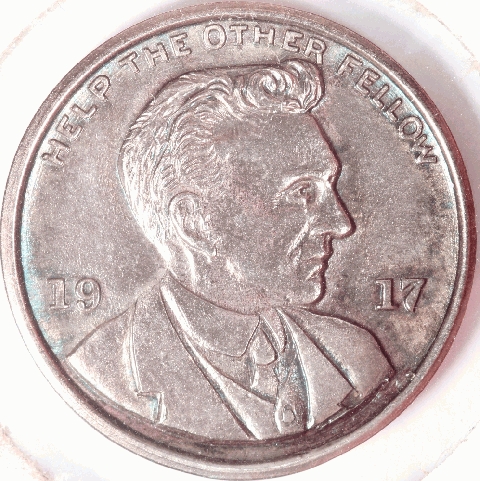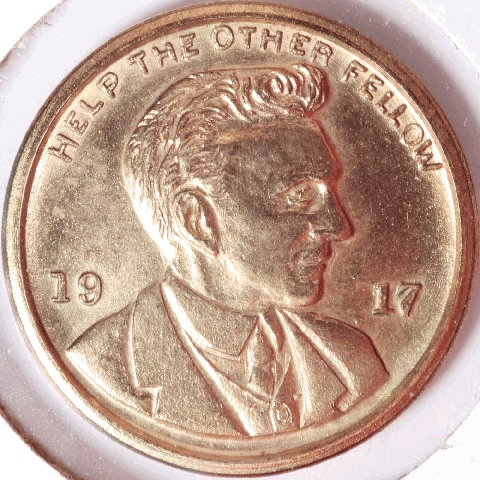Henry Ford's "Help The Other Fellow" cents
I recently purchased a set of these (copper, sterling silver, and gold-plated).
The dies were prepared in 1917, but because of the outbreak of World War I, the project was canceled. In 1963, these "coins" were struck to celebrate the 100th Anniversary of Henry Ford's birth.
So, I decided to post pix of the 3 "coins" (they are uniface, except for the manufacturer's name (Wehring Detroit), and "Sterling" appears on the silver one. Enjoy!



The dies were prepared in 1917, but because of the outbreak of World War I, the project was canceled. In 1963, these "coins" were struck to celebrate the 100th Anniversary of Henry Ford's birth.
So, I decided to post pix of the 3 "coins" (they are uniface, except for the manufacturer's name (Wehring Detroit), and "Sterling" appears on the silver one. Enjoy!



0
Comments
I just ttt'd it.
An authorized PCGS dealer, and a contributor to the Red Book.
<< <i>Cool little group there. Are they the size of a US cent? >>
Diameter is very slightly greater than a U. S. cent. Maybe they did that so they didn't get charged with counterfeiting.
An authorized PCGS dealer, and a contributor to the Red Book.
Coin's for sale/trade.
Tom Pilitowski
US Rare Coin Investments
800-624-1870
Henry Ford’s personal motto was "Help the other fellow," so in 1917, he decided to spread his adage through a special coin designed to resemble a Lincoln penny. The company commissioned Weyhing Brothers to create a die based on a photograph of Henry at age 30 and produced a few bronze prototypes. However, Henry's wife, Clara, thought the coin should display a more current image of her husband who was 54 at the time. Before a new die was created, however, the project was cancelled when the United States entered World War I. The original die sat in storage for over 40 years.
Then, in 1963, the Ford Motor Company celebrated the centennial of Henry Ford's birth. So Weyhing Brothers dusted off the old 1917 dies and produced bronze, silver, and gold-plated versions of the coin and distributed them at various community events.
The Penny Lady®
It made good business sense. Competitors followed suit, it helped the economy, and workers had more money to buy his cars.
Lance.
<< <i>Here's a different view of Henry Ford, A Titan of Industry -- and a Bigot. Businessweek called Ford "America's most notorious anti-semite" for much of the 20th century. And his welfare capitalism (the $5 workday, e.g.) was driven less by altruism and helping the other worker than by reigning-in heavy turnover and acquiring the best workers.
It made good business sense. Competitors followed suit, it helped the economy, and workers had more money to buy his cars.
Lance. >>
Yeah Ford was definitely not about helping the other fellow as during the Great Depression he felt that unemployment was primarily the fault of poor people and was quoted stating the following "I do not believe in routine charity. I think it a shameful thing that any man should have to stoop to take it, or give it. I do not include human helpfulness under the name of charity. My quarrel with charity is that it is neither helpful nor human. The charity of our cities is the most barbarous thing in our system with the possible exception of our prisons."
Looking for Top Pop Mercury Dime Varieties & High Grade Mercury Dime Toners.